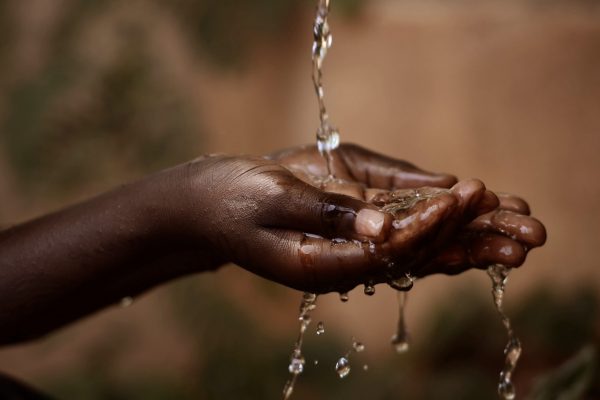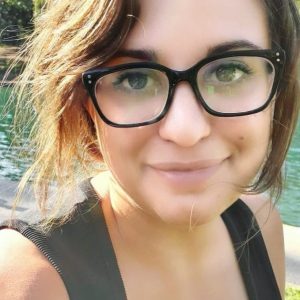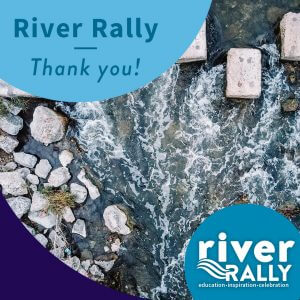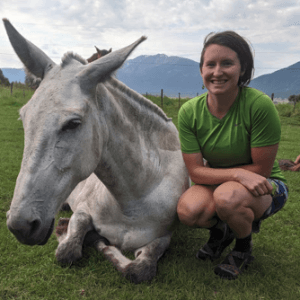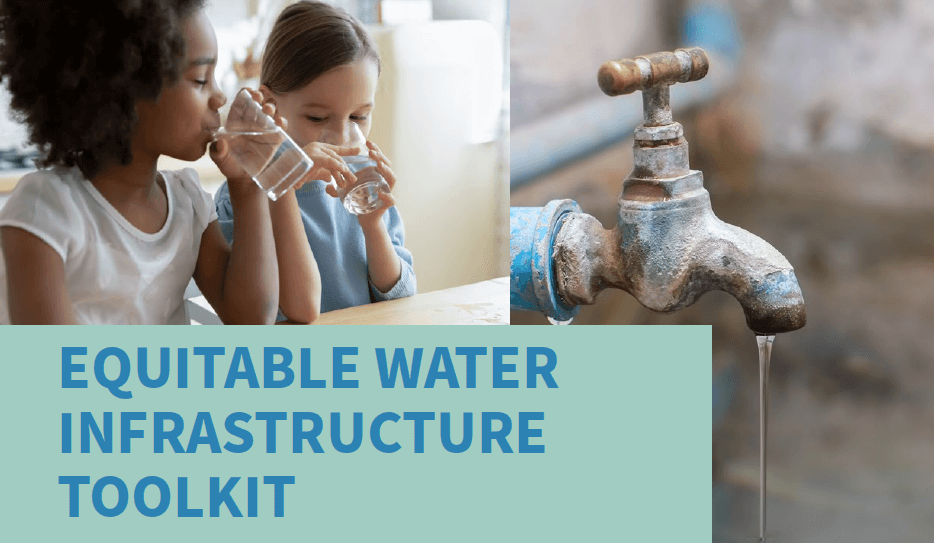River Voices: June 2021

Welcome to the June 2021 edition of River Voices. This month, we’re debuting our new Equitable Infrastructure Toolkit. We’re also sharing our staff’s internal plans and learning around Juneteenth. Plus, our gratitude for another inspiring River Rally!
How are decisions to use green infrastructure versus a detention pond to control stormwater runoff made? What are the options for making water rates more affordable? How can states prioritize those most in need through their water infrastructure programs? What funding is available? If you’ve ever wondered about these and similar questions, our new Equitable Infrastructure Toolkit was created for you. It offers education and practical advice for advocates at to get involved at the local, state, and federal levels, whether you’re a seasoned advocate or just starting to get involved for your water.
“…We are going to need farsighted, systemic changes to how we invest in water infrastructure and ultimately deliver water to people so that no one goes without.”
At Alliance for the Great Lakes, Anna-Lisa implements policy and advocacy campaigns to protect clean drinking water, advance water infrastructure funding and more. Meet Anna-Lisa.
A big thank you from our entire team for another inspiring River Rally! We hope all who participated found opportunities to connect, learn, and share knowledge. If you didn’t attend Rally, you can watch the Awards Panel and two moving keynotes from Catherine Coleman Flowers and Sandra Postel, available publicly on Facebook and YouTube.
Stay tuned for details on Rally 2022 soon!
Meet Erin Kanzig, who joined River Network in May as our Clean Water Policy Fellow. Erin is excited to join the dedicated team at the River Network to serve as a researcher, writer, and connector, creating a hub of information about state policies and advocacy efforts related to clean, affordable drinking water that’s accessible for all.
Explore the Equitable Infrastructure Toolkit
This toolkit will build your understanding of complex issues and learn how to influence water infrastructure funding and water affordability in your local community, at the state level, and nationally. By using this toolkit, you will be able to identify factors that affect water affordability and some approaches to addressing them, become familiar with water infrastructure funding and financing mechanisms (e.g. state revolving loan funds and bonds), and understand and influence decisions at the local, state, and federal levels.
Stacey and Anna are part of the team of talented contractors, including others from their organizations as well as the team at Rudd Resources who wrote and developed River Network’s Equitable Infrastructure Toolkit. Meet Stacey and Anna and learn more about their work developing the Toolkit!
This year, we will for the first time recognize Juneteenth (June 19) as a holiday for all River Network staff. Recognizing Juneteenth as an official holiday is a way of acknowledging that the July 4th holiday does not tell the full story of our country’s journey toward independence. As part of our EDI journey, River Network is committed to learning and public acknowledgment of these issues as one small step in the right direction.
Events & Learning Opportunities
River Network Drinking Water Access Exchange Call
June 15, 2:30p ET/11:30a PT
Join River Network staff and partners for this biweekly call. Frontline groups, advocates, and all others interested in staying up-to-date on all things drinking water access related are invited to join and learn more about what’s being done across the country to end water shutoffs and ensure safe and affordable water for all.
Putting Data to Action: Community Science, Partnership, and Advocacy for a Healthy Schuylkill River
June 22, 12p ET/9a PT
How can you put your data to action? Join us to learn how Bartram’s Garden staff, high school interns, and volunteers have worked together to use their water quality data, primarily collected for public boating safety, to advocate for action at the state level.
Meet River Network’s Equitable Water Infrastructure Toolkit
June 30, 2:30p ET/11:30a PT
Join us to learn about River Network’s new Equitable Infrastructure Toolkit! During this workshop, we’ll walk through this new resource, highlight key components around affordability, funding mechanisms, and more, and talk about how you might use it in your community.
Soil and Water Conservation Society (SWCS) 2021 Annual Conference
July 26-28
The Soil and Water Conservation Society (SWCS) invites the submission of live demos, virtual tours, field days, workshops, oral presentations, symposia, and posters for the 76th SWCS International Annual Conference, taking place virtually.
Rachel’s Network Catalyst Award: 2021 Application Cycle Now Open!
The Rachel’s Network Catalyst Award recognizes women of color making an environmental impact in communities across the country with prizes of $10,000 per recipient, public recognition, and networking and leadership opportunities. Apply yourself, or nominate a potential candidate from the network! Applications are due by Thursday, June 17, 2021.
H2Affordability: How Water Bill Assistance Programs Miss the Mark from EPIC
The new report released in May by the Environmental Policy Innovation Center (EPIC) finds that customer assistance programs offered by large water utilities to help low-income customers pay their water bills are poorly designed and leave out deserving customers.
2021 Urban Waters Learning Forum: Equity & Community Engagement in Water Conservation
The Friday before River Rally 2021, the Urban Waters Learning Network welcomed back Darryl Haddock and Jennifer Arnold to lead a group of Urban Waters Federal Partnership Ambassadors and their partners in deep conversations about equity in water conservation.
Urban Waters Learning Network Highlight: Daniel Joseph Wiley
Learn more about Daniel – an active member of UWLN’s Equitable Development collaborative – in their most recent member highlight. Daniel works on housing policy with Ironbound Community Corporation, advocating for both housing and environmental justice in Newark’s East Ward.
#WateratWork from the Water Hub at Climate Nexus
Over the last few months the Water Hub has been partnering with many across the network to help tell the story of the economic benefits of investing in water. Head to their new site to find support for your advocacy and organizing efforts to shape the national conversation around infrastructure.
Science Corner: New EPA Tools & Features Shared During River Rally
The latest from our science team.
At River Rally 2021, we were fortunate to hear from the US Environmental Protection Agency on multiple new and/or updated tools they have available to support water protectors in their work.
Escaped Trash Assessment Protocol (ETAP): a quantitative survey tool which provides a standard method for collecting and assessing litter data. The protocol is designed to be applied to a broad range of site types— e.g., parks, streets, parking lots, etc. — and environmental conditions — e.g., various hydrological and climatic regimes. It’s also mentioned in our Waste in Our Waters toolkit!
Enforcement and Compliance History Online (ECHO): search for facilities in your community to assess their compliance with environmental regulations. You can also use ECHO to investigate pollution sources, search for EPA enforcement cases, examine and create enforcement-related maps, analyze trends in compliance and enforcement data.
How’s My Waterway: learn about your water, explore data, and find out what’s happening in your community. How’s My Waterway provides the public with an easily accessible and understandable picture of water quality at a community, state, or national scale. Plus, it was recently updated to include layers from EJScreen.
What We’re Reading
FEMA/DOE COVID-19 Impact Analyses — FEMA and the Dept. of Energy are pleased to announce the launch of Argonne National Laboratory’s public-facing COVID-19 Impact Analyses site. The site features a series of indices, analyses, and maps that provide a detailed understanding of the socio-economic effects of the novel coronavirus outbreak.
“The multibillion dollar question: What will it take to fix the South’s broken water systems?” — A deep dive on water infrastructure needs in the South, how federal infrastructure proposals might help, and what else will still be needed.
“Housing Projects And Empty Lots. How Chanell Stone Is Reframing Nature Photography” — “When most people think about traditional nature photography, black and white images of towering mountains and rushing rivers in the American West are often what comes to mind… But missing from this tradition is another kind of landscape — the natural beauty found within cities.” Learn about Chanell Stone’s photography, capturing urban environments.


